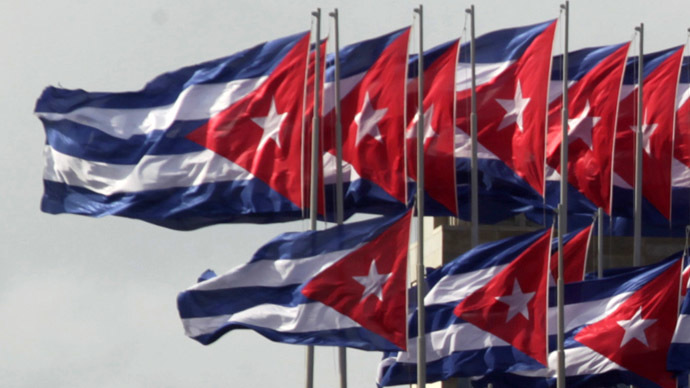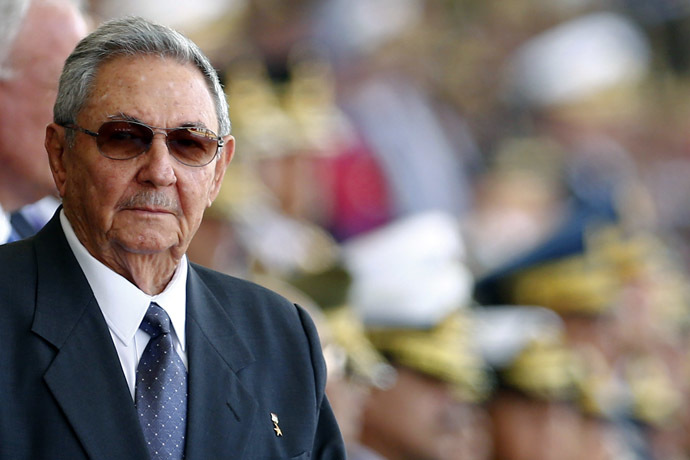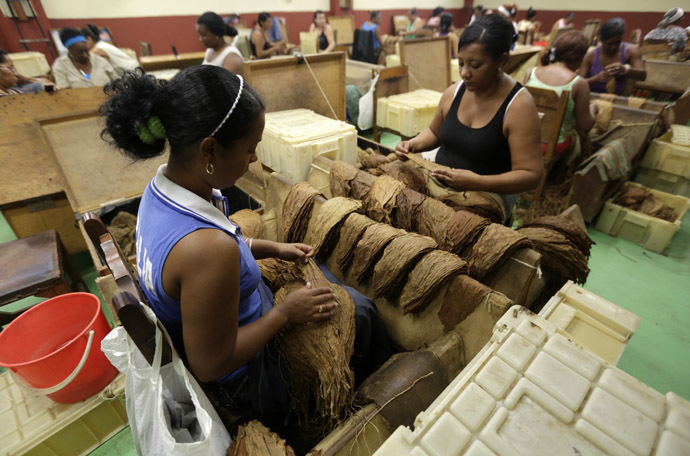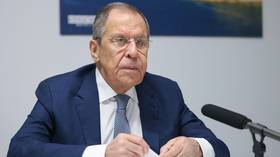Cuba’s economic reforms: Socialism with neoliberal characteristics?

Havana has prioritized foreign investment and private enterprise, slashed state-sector jobs, while seeking closer cooperation with the European Union. Will Cuba’s latest market-based reforms undermine the social gains of the 1959 Revolution?
Times are complicated in revolutionary Cuba. President Raúl Castro is well into his second term and plans to officially step down in 2018; he is now laying the groundwork for a new generation of leaders to take the reins of the island nation.
In an effort to address the stagnating economic conditions that have burdened the country since the collapse of the Soviet Union, President Raúl unveiled reforms in 2010 aimed at moving the island’s outdated command economy toward a mixed economy with greater emphasis on market mechanisms and self-employment.
Cuban authorities have acknowledged the difficulties posed by maintaining massive subsidies across various sectors, and plan to transfer up to 40 percent of the workforce into the private sector by 2015, where workers will be expected to pay taxes on their income for the first time.
The state has laid off some 500,000 workers, in addition to eliminating more than 100,000 non-essential jobs in the nation's national health service to cut costs. Havana has simultaneously relaxed prohibitions on small business activity and the individual hiring of labor. Former state-employees are now encouraged to start small businesses by driving taxis, opening barbershops, clothing shops and restaurants.
The state employs around 79 percent of the 5 million-strong labor force, while around 436,000 Cubans currently work in the private sector, according to government figures. Reforms are becoming bolder and Cuban politicians have recently approved a new law to draw in greater amounts of foreign investment, while tax-free special development zones have also been introduced. In these zones, foreign companies will be able to transfer their tariff-free profits abroad, receive contract extensions for up to 50 years, and retain full ownership entitlements, a drastic departure from decades of Soviet-style central planning.
Public health indicators suggest that Cuba has some of the highest quality health services in the developing world, which is provided to citizens free of charge. Despite a severe lack of resources due in part to decades of being under an economic embargo imposed by the United States, the country has one of the highest literacy rates in the world and free universal education for its citizens; it has also become one of the world’s leading exporters of teachers and doctors.
Cuban leaders have acknowledged how the country’s traditional state-run economic model can no longer support the across-the-board subsidies that fuel socialist programs and welfare services, giving rise to new legislation that would make the country much more reliant on market mechanisms and foreign capital.

Reagan’s ghost in Havana?
It may be seen as ironic that Cuba, with its history of sweeping nationalizations of corporations that dominated the economy before the revolution, is now sacking masses of state-sector workers and adopting a capital-friendly growth model intent on cutting down the public sector in favor of private enterprise and profit.
Cuba's decision to break from its traditionally closed economy and toward a free market system with neoliberal characteristics is not a signal that the country plans to yield toward unhinged capitalism. In the view of pragmatic thinkers in the Communist Party, these reforms represent an attempt to update the economic model, allowing Cuba to define its own distinct system appropriate to modern developments and external circumstances.
In essence, the Cuban leadership is attempting to develop a different model of market-socialism better suited to advancing the ideals of the revolution: egalitarianism, social justice, and resistance to imperialism and US dominance. Cuban leaders have acknowledged the negative features of market reforms, which can often exacerbate income disparities and entrench cronyism, and have pledged to maintain its public health services, universal education systems, and other features that do not adhere to the ideology of free market capitalism.
Cuban workers will have three main avenues of employment to choose from. While the largest portion of workers will run small businesses and shops, the government has prioritized the agricultural sector to promote food self-sufficiency. The state subsidizes land, seeds, and chemical-free fertilizer for farmers and vegetable growers, and agricultural collectives are also seen as a viable career path.
Other workers will find employment in sectors that rely on foreign investment. Cuba’s newly-passed foreign investment law, which comes into effect in June, offers attractive incentives to foreign companies. Taxes on profits have been reduced from 30 to 15 percent, and companies will be exempt from paying taxes for the first eight years of operation; foreigners doing business on the island would be exempt from paying any personal income tax.
An exception remains for companies that exploit the country’s natural resources, such as nickel or fossil fuels, which will pay taxation rates as high as 50 percent. Foreign investment will reportedly be allowed in all sectors, however investment and marketization will be barred in all fields related to medical services, education and national defense to safeguard the country’s socialist system.

Ending the embargo
The US unilaterally imposed a near-total embargo on Cuba in 1962 following the nationalization of properties belonging to US citizens and corporations, which remains in place to this day. Washington has kept Cuba on a list of ‘state sponsors of terrorism’ since 1982, while the embargo has been consistently strengthened under several US administrations despite the United Nations calling for its end for 22 consecutive years.
Cuban authorities claim that the economic damages accumulated after half a century as a result of the implementation of the blockade amount to $1.126 trillion, and President Raúl knows he needs erode the foundations of the embargo before significant economic growth can take place. Havana believes that getting the European Union into its corner is the best way to move forward, and negotiations with representatives from Brussels are set to begin in late April. Havana will try to overturn the EU's ‘common position’ on Cuba enacted in December 1996, which calls for greater human rights and democratic conditions in exchange for improved economic relations.
The recent visit by French FM Laurent Fabius, the highest-ranking French official to visit the island in 31 years, should be seen in this context. According to diplomatic sources, Fabius was testing the waters prior to the negotiations with EU members.
France has interests in winning contracts in markets where French firms are traditionally weak, and understands the regional importance of Cuba as investment pours in from both Brazil and Mexico, who are increasing their presence in the country.
Normalizing trade relations with the EU would qualify as a major step forward toward bolstering foreign investment, but the alignment of business interests is not expected to have major reverberations on Havana’s positions on global political issues, where it is aligned closely to Russia and China.
On the eve of Fabius’ visit, state-owned media in Cuba published critical commentary of the French municipal elections, criticizing President François Hollande for doing “exactly the opposite” of what was promised during his election campaign, and for conciliating “the neoliberal demands of Berlin and Brussels.” The editorial could be seen as subtle way of the Communist Party reinforcing its political nonalignment, or as a way of deflecting criticism from hardliners who would prefer that Cuba maintains its distance from Western powers.

As more emphasis is placed on making Cuba an attractive destination for foreign investment, Europe is expected to become more vocal in supporting a change in US policy toward the island nation.
Cuba’s diversification of trade relations also comes at a time when the leftist government of Venezuela faces protests and serious economic difficulties. The leadership in Caracas supplies cheap oil to Cuba and also pays for Cuban doctors and other medical specialists sent to Venezuela, while some economists claim that Cuba receives over $6 billion per year from this arrangement, representing a more significant subsidy than that which the island received from the Soviet Union, which paid above-market prices for sugar and other goods.
If attempts to enact regime change in Venezuela are realized, it will have detrimental short-term effects on Cuba, which the leadership in Havana seems to be well aware of. Much like other socialist governments that survived the fall of the Soviet Union, Cuba is now reforming its economy to conform to global capitalism, but unlike other countries that have empowered their oligarchical elite through marketization, leaders in Havana claim that the primary objective of attracting foreign capital is to support social programs, the socio-economic development of the country, and the distribution of wealth among all Cuban citizens.
Marketization may likely exacerbate income inequality and spur elite corruption in the early stages, and these negatives features of capitalism should be kept in check. If state-linked cronies are perceived as being the most advantaged by foreign investment without earnings being adequately channeled to social welfare programs and development, it will have negative political ramifications.
If the new economic system can be leveraged to maintain socialist benefits and bolster Cuba’s biotechnology, pharmaceutical and renewable energy sectors, the country may be in a position to assert its independence more effectively through a mixed-development model that can be replicated elsewhere.
The statements, views and opinions expressed in this column are solely those of the author and do not necessarily represent those of RT.
The statements, views and opinions expressed in this column are solely those of the author and do not necessarily represent those of RT.













